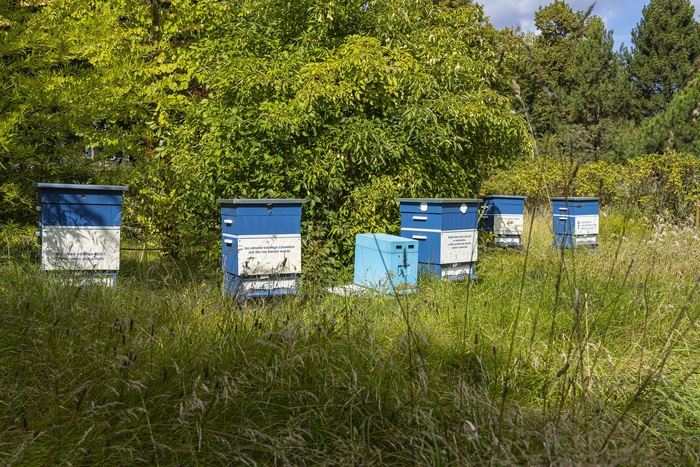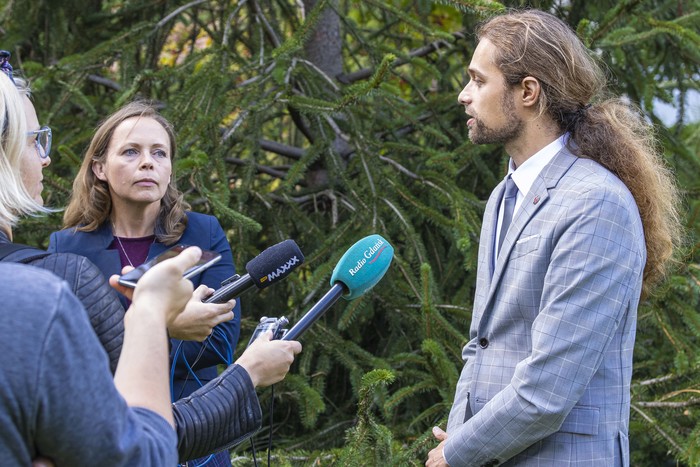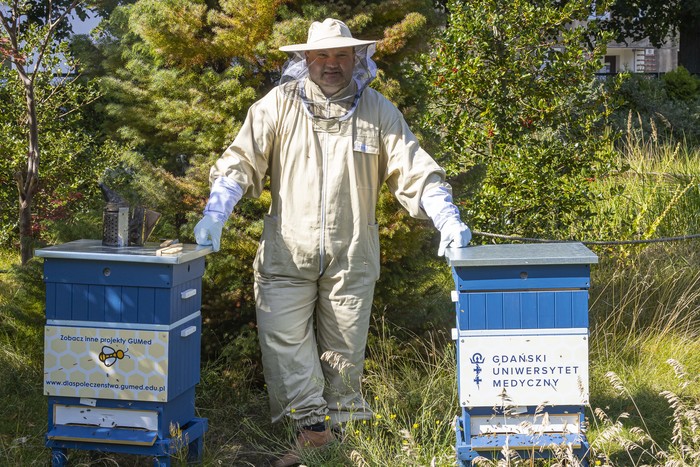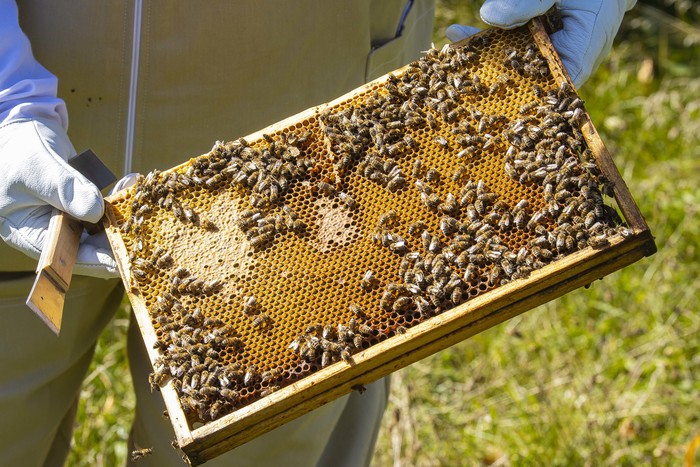New residents of the University's apiary
6.09.2021
The Medical University of Gdańsk joined the institutions supporting honey bees. Five bee families appeared in the hives of the Medicinal Plant Garden at the Department of Pharmacognosy of the MUG. However, it is not the first city apiary at the University. First winged tenants moved into the Garden last year. A press briefing devoted to this initiative was organized on September 2, 2021 in the Medicinal Plant Garden of the MUG.
Currently, the University has 10 hives. From the medical and pharmaceutical viewpoint, honey bees are very important. Thanks to their breeding, we can efficiently obtain a number of substances used in medicine.
- The creation of an apiary is related to the fact that bee products are used in medicine and have a wide range of significance – they are included in medicinal products, but also in a number of dietary supplements and medical devices. In addition to the honey itself, we use, i.e., bee berry, royal jelly, and propolis is also widely used. In this way, we also address the ecological aspect – the importance of bees and other pollinators – emphasized Loretta Pobłocka-Olech, Pharm.D., Assistant Professor at the Department of Pharmacognosy, keeper of the Medicinal Plant Garden of the MUG.

- Promotion of health, medical knowledge and pro-ecological practices among the local community has always been important for the Medical University of Gdańsk. We have undertaken a number of initiatives, such as “Piknik na Zdrowie” (“Picnic for health”), “Nauka to Ludzie” (“Science is People”) or “Bądź zdrów bez kolejki” (“Be healthy, jump the queue”). Water fountains have also been installed on the campus. We also joined the action “Gdańsk bez plastiku” (“Gdańsk without plastic”). The University’s CSR policy was formalized by signing the University’s Social Responsibility Declaration in September 2019. Therefore, a natural step in continuing this pro-ecological and pro-social policy was to build a municipal apiary. Honey from these apiaries will be collected in order to promote the health-promoting properties of honey and to draw attention to the importance of protecting bees for our environment_ – said Adam Tuszyński from the Promotion Unit of the MUG.

Loretta Pobłocka-Olech, Pharm.D. and Adam Tuszyński during press briefing
Introducing bees in the Medicinal Plants Garden will show that they are important to each of us. It is thanks to them that it is possible to reproduce more than 70% of plants. Bees can also be supported by creating flower meadows or by planting honey plants on balconies or in home gardens.
- If we see a bee on our balcony or garden table, do not panic and kill it. It probably landed to rest for a while on the flight back to the hive. If it is cold, you can help bee by giving it a drop of lukewarm water with sugar – explained Wojciech Tabaka, bee keeper in the Medicinal Plants Garden.

Wojciech Tabaka, keeper of the MUG’s appiary
Bees are not aggressive by nature and will not attack humans unless irritated, so it is important not to get too close to the hives. They do not like intense smells, such as alcohol, intense perfumes and horse sweat. Such odors may pose a risk of stings.
- You should behave with common sense near the hives. Such behavior should protect us from possible problems – added Wojciech Tabaka.
The MUG’s apiary meets all the requirements for setting up hives, it is properly secured and set away from roads.

In the fall of 2021, 73 years will have passed since the official opening of the Medicinal Plants Garden at our University. There are over 1,500 taxa of plants grouped in 4 divisions. The garden is one of the few places in Poland, open to everyone, where you can see how plants look, smell and develop, including those unusual in home gardens. The garden is also inhabited by animals. You can meet several species of birds here, two foxes or hedgehogs. In May 2020, more of the latter appeared, thanks to the five hives in which bees have made their home. This year, we have doubled the number of hives in the Medicinal Plants Garden. In total, there are 10 hives at the Faculty of Pharmacy. Here, bees find flavors that cannot be found anywhere else in the Tri-City.
photo: Paweł Sudara/MUG
Archives
- Academic Year 2024/2025
- Academic Year 2023/2024
- Academic Year 2022/2023
- Academic Year 2021/2022
- Academic Year 2020/2021
- Academic Year 2019/2020
- Academic Year 2018/2019
- Academic Year 2017/2018
- Academic Year 2016/2017
- Academic Year 2015/2016
- Academic Year 2014/2015
- Academic Year 2013/2014
- Academic Year 2012/2013